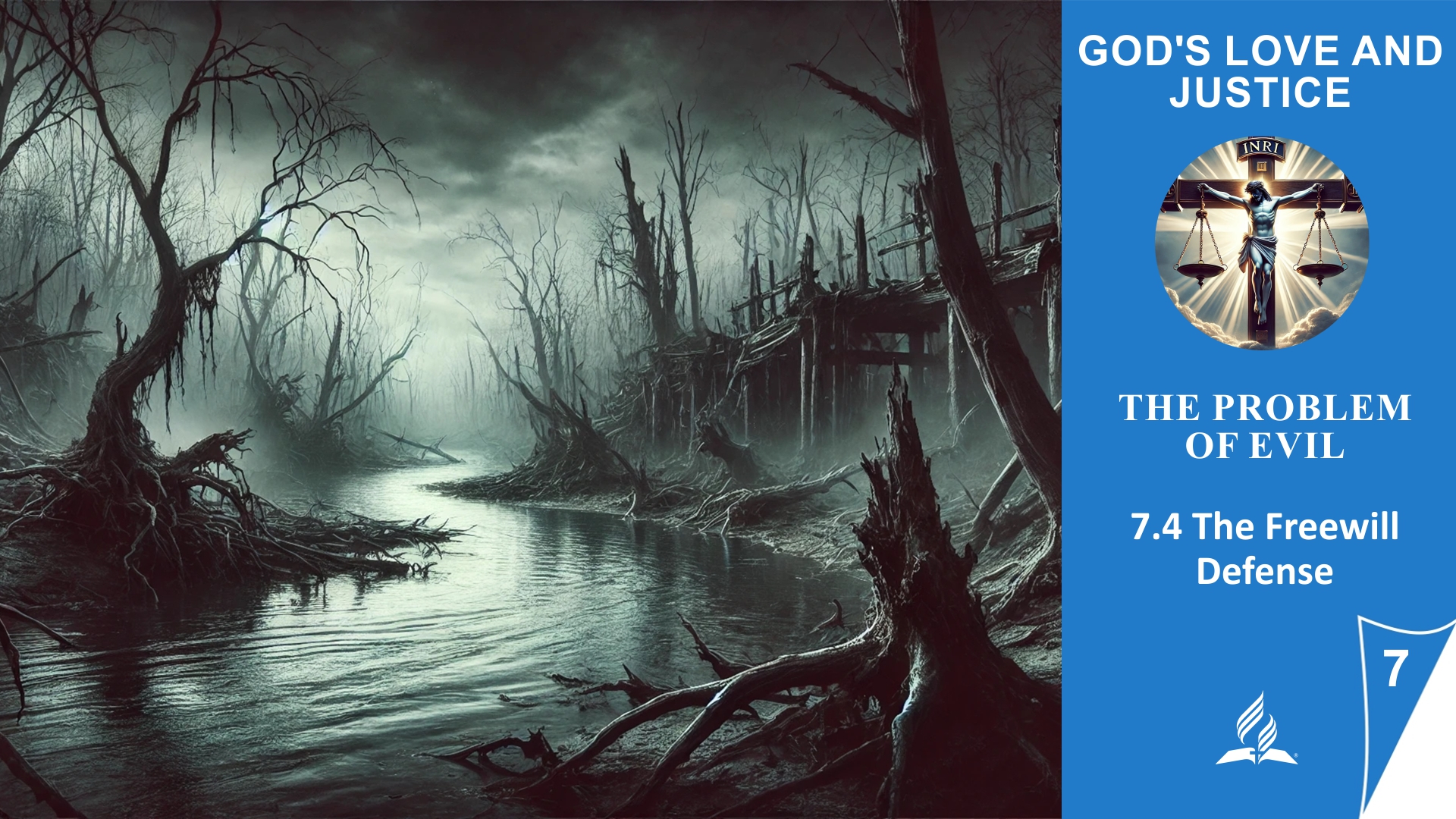


7.4 The Freewill Defense
Why True Love Cannot Exist Without Freedom
Read Genesis 2:16–17. How do these verses demonstrate the moral freedom granted to Adam and Eve?
-
Free Will as a Divine Gift
In Genesis 2:16–17, God says to Adam:
“Of every tree in the garden you may freely eat; but of the tree of the knowledge of good and evil you shall not eat, for in the day that you eat of it you shall surely die.”
These words clearly show that Adam and Eve had a choice. God gave them moral freedom—the ability to choose between obedience and disobedience. Without free will, a command would have been meaningless.
✔ God did not create man as a robot, but as a being with genuine freedom of choice.
✔ True love and obedience can only exist voluntarily—otherwise, they would be meaningless.
-
The Consequences of Free Will
Adam and Eve chose disobedience—and thereby opened the door for sin and evil in this world. In Genesis 4, the dramatic consequences are immediately apparent: Cain kills his brother Abel.
💡 Free will comes with responsibility.
People can choose either good or evil.
• Sin is not God’s fault; rather, it is the result of wrong decisions.
-
Free Will Throughout the Bible
Throughout Scripture, we repeatedly see that God gives people choices:
✔ Deuteronomy 7:12–13 – Obedience brings blessing, disobedience leads to difficulties.
✔ Joshua 24:15 – “Choose for yourselves this day whom you will serve.”
✔ Psalm 81:12–15 – God calls His people to repentance, but they must choose for themselves.
✔ Isaiah 66:4 – God calls, yet some reject Him.
God forces no one to follow Him—He invites, but the decision is ours.
What Does This Mean for Our Lives and Our Faith?
1️⃣ Our decisions have consequences.
2️⃣ God respects our free will—even when we make mistakes.
3️⃣ True love for God is only possible because we can choose it voluntarily.
💡 Free will means responsibility—but also the wonderful opportunity to follow God out of love and conviction.
Consider the example of the Sony Corporation’s development of a robotic dog named Aibo. It never gets sick, has no fleas, does not bite, needs no vaccinations, and does not shed. Would you trade your living, breathing dog for an Aibo? If not, how might your decision help you better understand why God created us as He did—with free will, despite the risks?
Most people would not exchange their real dog for a robotic one—why?
A real dog shows genuine affection, has its own personality, and forms a deeper connection with its owner. Even if it is sometimes disobedient or causes problems, the relationship is valuable because it is genuine. A robotic dog may function perfectly, but it cannot exhibit true love or form a genuine bond because it is merely programmed.
👉 What does this have to do with free will?
God could have created us so that we automatically obeyed—without free will, without the possibility of making mistakes or sinning. But that would not be true love, nor a genuine relationship.
💡 Why did God create us with free will, despite the risks?
✔ Because love is only genuine when it is chosen freely.
✔ Because a true relationship with God is worth more than enforced obedience.
✔ Because without free will, we would not be moral beings—but rather programmed machines.
Yes, free will means that people can make mistakes and do evil—but it also enables true love, genuine choices, and a deep relationship with God.
The concept of free will is not only a theological doctrine, but it affects every aspect of our lives and our faith. Every day we make decisions—some small, others with far-reaching consequences. Our ability to choose is a gift from God, as well as a great responsibility.
-
Our Daily Decisions Have Consequences
👀 Free will means that we can consciously choose between good and evil.
✔ What we think, say, or do affects not only ourselves but others as well.
✔ We are responsible for our words and actions—in our personal lives, relationships, and our faith.
👉 Practical Application:
Before making important decisions, consider: “Will this choice bring me closer to God or push me away from Him?”
• Live deliberately—not out of fear, but out of love and responsibility.
-
True Love for God Cannot Be Forced
❤️ God forces no one to love or serve Him.
He gives us the freedom to choose for or against Him—because only love chosen freely is genuine.
💡 Why is this important?
Our faith is not built on coercion, but on love.
• We can choose God freely—and that makes our relationship with Him valuable.
👉 Practical Application:
• Faith should not be an automatic response. Examine your heart: Do you love God out of conviction or merely out of habit?
• God invites you—but you must decide for yourself whether to follow Him.
-
Responsibility for Our Lives and Actions
🎯 Our free will does not mean that every choice is “right” or without consequence.
✔ Adam and Eve chose wrongly—and the consequences were severe.
✔ Even today, poor decisions can hurt us and others.
✔ But God always offers a way back—through forgiveness and grace.
👉 Practical Application:
Learn from your mistakes. Everyone makes wrong choices, but there is always a second chance.
• Use your free will to do good. Love, help, forgive—these are conscious choices you can make.
Conclusion: Living Freedom with Responsibility
💡 Free will means more than merely choosing between obedience and disobedience—it is the possibility of living a life in a genuine relationship with God.
✔ Our decisions influence our lives and the lives of others.
✔ True love for God can only exist voluntarily.
✔ We have the responsibility to use our free will rightly.
🙌 God created us to love Him freely—and that decision makes our lives meaningful.
True love and genuine faith can only exist in freedom—God invites us, but the decision is ours.
(Visited 20 times, 1 visits today)























